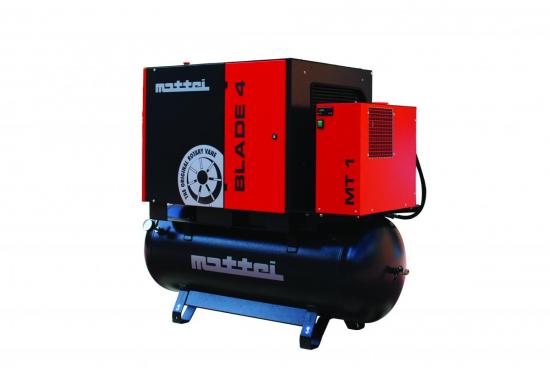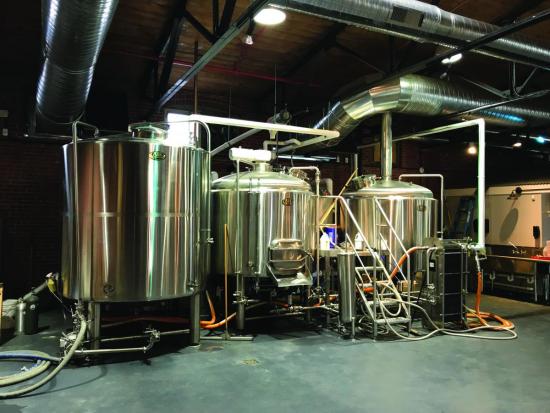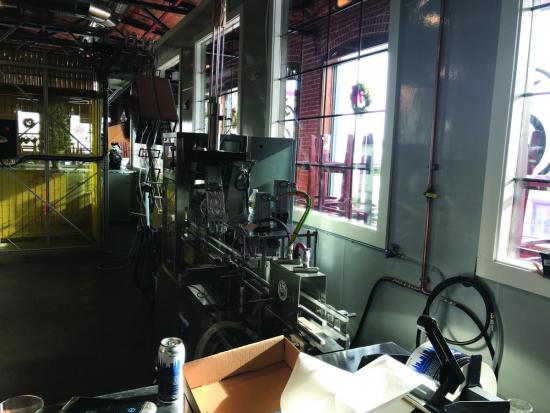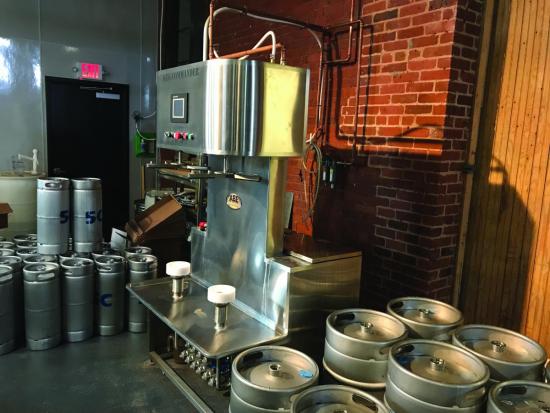Compressed air is a critical aspect of brewing craft beer and no one understands that better than Five Churches Brewing, which recently looked to MidState Air Compressor, Inc. to recommend and install an appropriate compressed air system for virtually every aspect of beer production including brewing, canning and keg washing.
Together, Five Churches (www.fivechurchesbrewing.com) and MidState Air Compressor Inc. (www.midstateaircompressor.com) opted to install a rotary vane air compressor package at the microbrewery to reliably and quietly deliver clean dry air for its brewing operation. The compressed air system allows Five Churches to not only consistently produce quality beers customers have come to appreciate – but continue to grow its burgeoning business.
Craft Beer and Wood-Fired Pizza
Owned by the Lemnotis family and located in downtown New Britain, Connecticut, Five Churches Brewing is a combination microbrewery and taproom that typically offers 12 different craft beers at any given time. It also serves wood-fired pizza.
The brewery and taproom, which offers seating for 100, is unlike most since it’s located on the second floor of building, providing panoramic views of the city’s downtown. The first floor of the building houses the Lemnotis family’s transportation business. Since it opened in March 2018, the microbrewery has gained increasing popularity.
Five Churches Brewing is a combination microbrewery and taproom that typically offers 12 different craft beers at any given time, along with wood-fired pizza.
Clean, Dry Air: A Top Priority
When planning the microbrewery, a priority for Five Churches’ was the installation of a compressed air system able to provide clean, dry air used in multiple processes and do so with virtually zero potential for contaminants, including oil, water and particulates. The system also needed to operate reliably for years to come given the critical role compressed air plays in the brewing operation.
After analyzing plans for Five Churches’ microbrewery and its compressed air needs, Midstate Air Compressor, Berlin, Connecticut, recommended the installation a Mattei Blade 7 SE Quality Air Station powered by a food-grade-oil lubricated 7.5 horsepower (HP) oil-flooded rotary vane air compressor rated to deliver up to 36 scfm at 115 psi.
A rotary vane air compressor package was the best style of machine for Five Churches for multiple reasons, according to MidState Air Compressor Owner Sal Calvo.
“We work with a lot of microbreweries and many don’t have the budget to support the upfront cost of an oil-free scroll air compressor,” Calvo said. “Yet they need a reliable system that provides clean, high quality air in order to produce quality beer and prevent equipment damage. We took all of this into consideration with the system at Five Churches.”
When considering reciprocating style air compressors for microbreweries, duty cycle capability of the air compressor is a major factor given the compressed air profile of a typical brewery operation, Calvo said.
“Brewery processes need consistent airflow,” he said. “We decided against a reciprocating-style air compressor since that type of unit is designed for intermittent use and is not constructed for long duty cycles that breweries like Five Churches require.” Inappropriate use of a reciprocating compressor can result in premature system failures, production halts, and require unnecessary service requirements, Calvo said.
The rotary vane air compressor package recommended for Five Churches also addresses the need for clean air, which is critical to the safety and quality of its craft beers. Toward that end, the unit at Five Churches, which is mounted on an 80-gallon air receiver tank, provides high efficiency, oil/air separation with minimal oil consumption and oil carryover in compressed air to a maximum 1 to 3 parts per million (ppm).
The air compressor package includes a built-in air-cooled aftercooler and a refrigerated air dryer with a 0.1-micron particulate filter mounted on the inlet. The dryer features a moisture separator with a timer-operated auto drain. MidState Air Compressor also installed a 0.01 ppm coalescing filter together with an activated carbon 0.003 micron filter downstream of the dryer to provide an even higher level of filtration ahead of the microbrewery’s keg washer.

The air compressor package was provided with a refrigerated dryer and filtration system to provide dry and oil-free compressed air.
It’s essential for small breweries to install a proper compressed air system given the application, said Kyle Wicklund of Midstate Air Compressor who oversaw the compressed air system installation at Five Churches.
“Breweries need to follow Five Churches’ example and make compressed air a top priority. When the goal is an efficient and contaminant-free system, it’s important to properly plan and budget for the right air compressor, dryer and filtration system,” Wicklund said.
In addition to the air compressor and filtration system, MidState Air Compressor designed and installed the piping system, which provides consistent air pressure and flow to various processes. The system is constructed of copper piping to further ensure the air delivered is clean and free of particulates. MidState Air Compressor also chose copper piping for aesthetics since the brewhouse is visible to customers.
The piping system routes air from the air compressor on the first floor of the building to a 1-inch wide header located on the second floor. From there, the system splits into ¾-inch wide copper lines to supply air to the brewhouse, canning line and keg washer. Also located on the first floor are two 750-pound C02 tanks that make up a separate system used to provide C02 to processes.
Brewhouse Calls for Steady, Reliable Air
Compressed air is vital to Five Churches’ 20-barrel (bbl) brewhouse, which typically brews beer several times per week. American Beer Equipment (A.B.E) supplied the equipment for the brewhouse and the brewer’s other main operations. A.B.E (www.americanbeerequipment.com) is located in Lincoln, Nebraska.
A master Programmable Logic Controller (PLC) is used to control the brewing process at Five Churches. It typically takes eight to 14 hours to brew a batch of beer, depending on the product being produced.
Among the key components of the brewhouse are a series of tanks, beginning with 40-bbl tank used to store and heat water. Heated water is fed to a 20-bbl mash tun, which mixes the water and barley malt in a process called malt conversion. The process uses natural enzymes in the malt to break the malt’s starch down into sugars. The mash tun also strains out the grain and converts the mixture into a liquid known as wort.

A steady and reliable flow of compressed air is crucial to the brewing process at Five Churches’ 20-barrel (bbl) brewhouse.
Wort is then transferred to a 20-bbl kettle where it is boiled for a set time period based on the beer being brewed. From the kettle, the sterilized mixture is fed to a fermenter where yeast is added to the process to convert the wort into beer by producing alcohol in various flavors. After maturation, the beer is carbonated and transferred to a bright beer tank, which feeds consumable beer to kegs and the operation’s canning line.
Clean compressed air with the help of liquid sensors and the master PLC controller powers as many as 20 pneumatic valves used to carefully orchestrate the transfer of hot water, wort and beer from one vessel to the next. In all, the brewing process consumes 5-7 cfm of air at between 95 to 130 psi.
Five Churches Head Brewer Austin Japs said a steady and reliable flow of compressed air is crucial to the brewing process, as is the quality of the compressed air.
“It’s crucial for the valves to open and close instantaneously when called on since an interruption in the process could ruin an entire batch, costing us thousands of dollars and lost productivity. The air coming through those lines also needs to be as pure as possible since we’re producing a consumable product,” Japs said.
Canning System Optimized for Productivity
In addition to serving tap beer, Five Churches cans different varieties of beer for sale. The microbrewery is equipped to produce approximately 2,000 cans of beer per week.
An A.B.E.’s CraftCan35™ canning system is at the heart of the canning operation, which relies on compressed air for operation. The self-contained canning machine is rated to fill, seam and lid up to 35 cans per minute.
Primary components of the 8-foot-long by 2-foot-wide machine include a five-head/three-port in-line automatic filler with CO2 purge control, a C02 gas tunnel, lid magazine, servo seamer, air knife and conveyor system. The PLC-controlled system, which rests on wheels for ease of mobility, features an HMI touchscreen and can also be manually controlled.

Five Churches’ self-contained canning machine can fill, seam and lid up to 35 cans per minute.
The canning process at Five Churches begins when a de-palletizer automatically loads empty aluminum cans onto the CraftCan system. The first station on the system rinses the empty cans with pure water to remove any potential dust or particles inside the cans. The cans are then conveyed to the filling station where they are purged with C02 to protect against dissolved oxygen and filled with beer.
The system then introduces another short microburst of C02 to the tops of the cans shortly before the machine places lids on the cans, which are then conveyed to the servo seamer for sealing. Once seamed, the cans move through an exterior rinsing process that includes the use of an air knife for drying. As a final step, Five Churches’ crew manually applies labels and packages the cans for sale.
The compressed air system delivers 20 cfm of air at 105 psi for conveying, filling, lidding, and drying. An electronic motor controls the servo seamer, while a separate system supplies C02.
“The compressed air system does an excellent job at delivering a consistent supply of air at the proper pressure, which ensures the canning system operates as designed,” Japs said, adding that productivity is essential given the company’s small brewing crew that includes two brewing assistants who work closely with Japs. “The end result is properly filled cans at the needed rate without any waste of beer or cans.”
Keg Washer Expedites Keg Cleaning
Keg washing is another process that calls for clean, dry compressed air at all times. Five Churches typically devotes one full working day per week to keg washing.
The microbrewery uses an automatically controlled A.B.E Keg Commander™ keg washer to expedite the keg washing process. The keg washer is rated to clean and purge up to 30 kegs per hour using a 16-step cleaning cycle. Key components of the PLC-controlled machine include a dual-head system for cleaning two different sized kegs simultaneously, two separate tanks for the cleaning solution and water, low-liquid sensors inside the tanks, and an HMI touchscreen.

A keg washer eliminates the need for manual keg cleaning, while also ensuring availability of clean kegs.
Japs said the importance of a consistent supply of clean, dry air for keg washing cannot be understated.
“Clean compressed air is essential since we’re using it to eliminate any cleaning solution at the end of the cleaning cycle and then refilling the keg with beer to be consumed,” Japs said.
Keg washing begins when two empty kegs are manually placed on the dual-head mounting system of the machine. The unit’s electric pumps then fill the kegs with the cleaning solution and water. Next, the kegs are pressurized with compressed air to flush out the remaining solution, which then flows into a drainage pipe when upon completion of the cleaning cycle. In all, the keg washer uses 20 cfm of compressed air per keg at 75 psi to ensure thorough flushing. As a final step, a separate system is used to purge each keg and re-pressurize them with 20 cfm of CO2 at approximately 15 psi.
“In addition to clean air, knowing we can rely on the compressed air system for keg cleaning is important because otherwise we would spend a whole week manually cleaning kegs,” Japs said. “With this keg washer, all we need to do is drop the kegs on the machine and press start. The entire cleaning cycle is about seven minutes and we come out with clean kegs ready to refilled.”
Making Beer and Having Fun
Since it opened for business Five Churches has experienced steady growth and increased interest in its taproom and craft beers. The early success is a strong indication of more success to come especially since Connecticut is home to a thriving craft beer industry built around high customer demand.
“The craft beer scene in Connecticut continues to grow as does the competition,” Japs said. “All that means is that we’re going to continue to produce top-quality beers that will make us stand out, while we also have fun in the process.”
For more information about MidState Air Compressor, visit www.midstateaircompressors.com.
All photos courtesy of MidState Air Compressor and Five Churches Brewing.
To read similar articles about the Food and Beverage Industry, please visit www.airbestpractices.com/industries/food.




